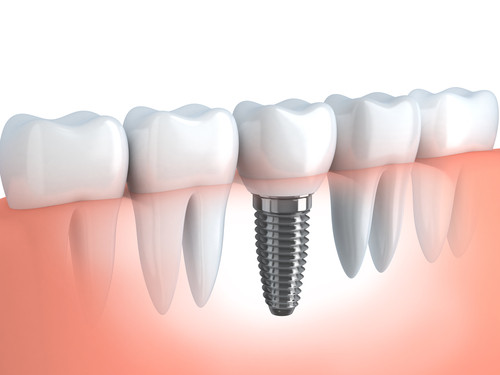
Dental Implants
If you’re missing one or more teeth, you’ve probably notices that there are a few other things you’re missing too, like your natural smile or the ability to bite or chew whatever foods you want. Fortunately, with today’s advanced dental implant technology, you can replace missing teeth with a lifelong solution that will help you to regain not just the look of your natural teeth, but also their function.
Here at Cadena Family Dentistry, we offer state-of-the art implants designed to be strong as well as beautiful.
Dental implants are the only solution for replacing lost teeth that address the missing bone as well as the missing root structure – which means they are the only solution that helps to preserve the bone structure of your jaw. Because of this, dental implants are the most ideal method of replacing missing teeth – even more so than bridges or dentures.
About The Implant
The implant itself consists of a small titanium post that is placed and anchored within your jawbone. We use titanium because it is a biocompatible metal, which means it is one that your body will not reject. Once the post or posts are in place, they provide strength and stability for the tooth that is placed on top of it by acting the way a tooth’s natural root would.
 Regardless of whether your individual implant needs are simple or very complex, we are sure to care for your entire treatment from start to finish – unlike some other offices where portions of your procedure are outsourced or subcontracted. There is no need to go from practice to practice or to see multiple specialists for different aspects of your dental implant treatment. It doesn’t matter if you need just a single implant or something more complicated like bone grafting, we are here from start to finish. We believe in comprehensive one on one highly personalized care that ensures you’ll get a long-lasting result for the health, beauty and function of your smile.
Regardless of whether your individual implant needs are simple or very complex, we are sure to care for your entire treatment from start to finish – unlike some other offices where portions of your procedure are outsourced or subcontracted. There is no need to go from practice to practice or to see multiple specialists for different aspects of your dental implant treatment. It doesn’t matter if you need just a single implant or something more complicated like bone grafting, we are here from start to finish. We believe in comprehensive one on one highly personalized care that ensures you’ll get a long-lasting result for the health, beauty and function of your smile.
Before we can do anything else, however, we need to get a comprehensive evaluation of your existing teeth, your bone levels and structure, and a fully complete and thorough medical history. As a part of those evaluations, you may need to undergo a series of film x-rays, a digital panoramic x-ray, a 3D CT scan or even a combination of the above. Each of the scans is safe, quick and painless and is designed to help us determine the shape, density and integrity of the underlying jawbone. These scans are also quite helpful in determining whether or not there are pockets of infection or weakness that may need to be addressed before the implants are put in to ensure the best possible surgical result.
